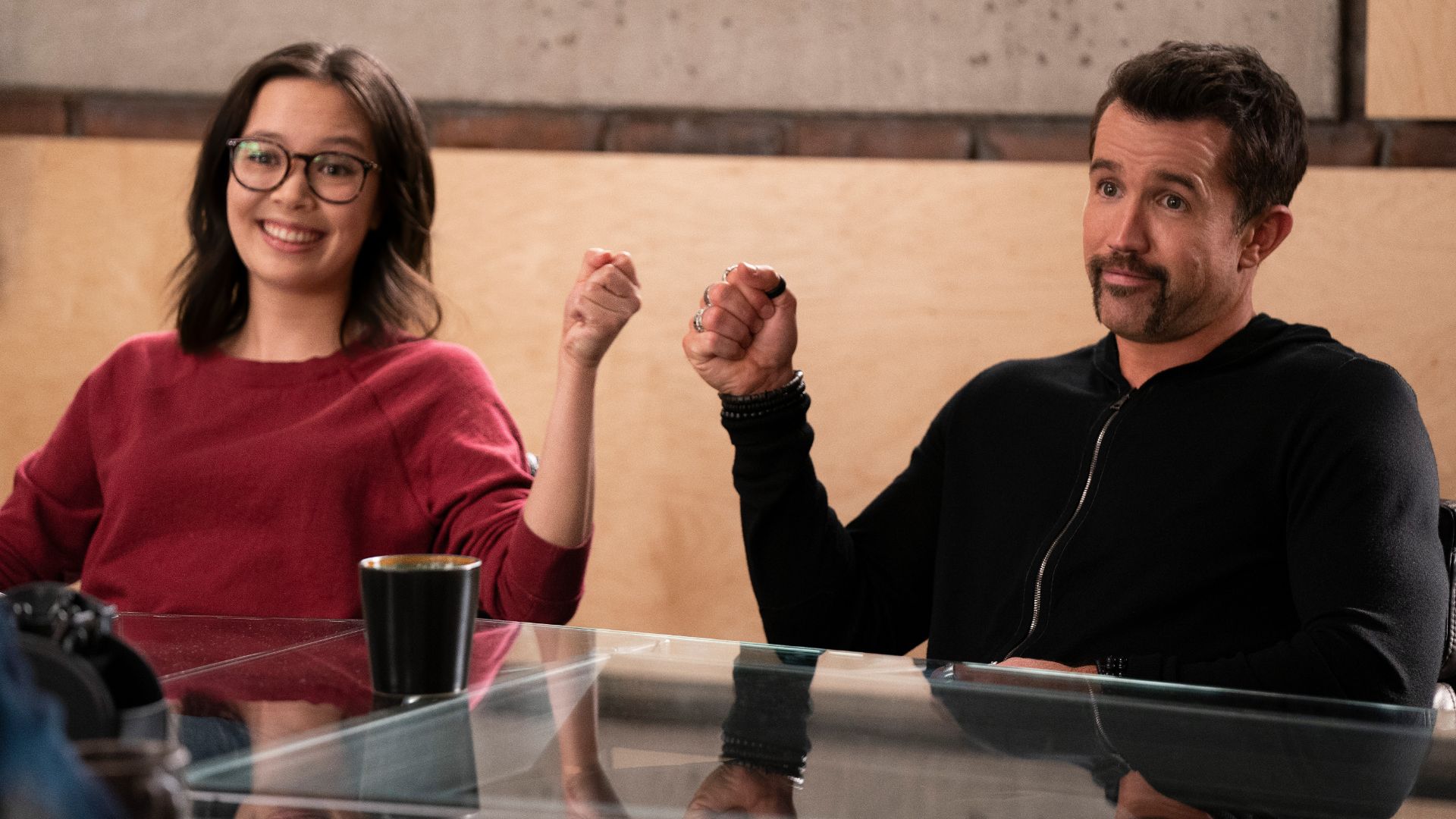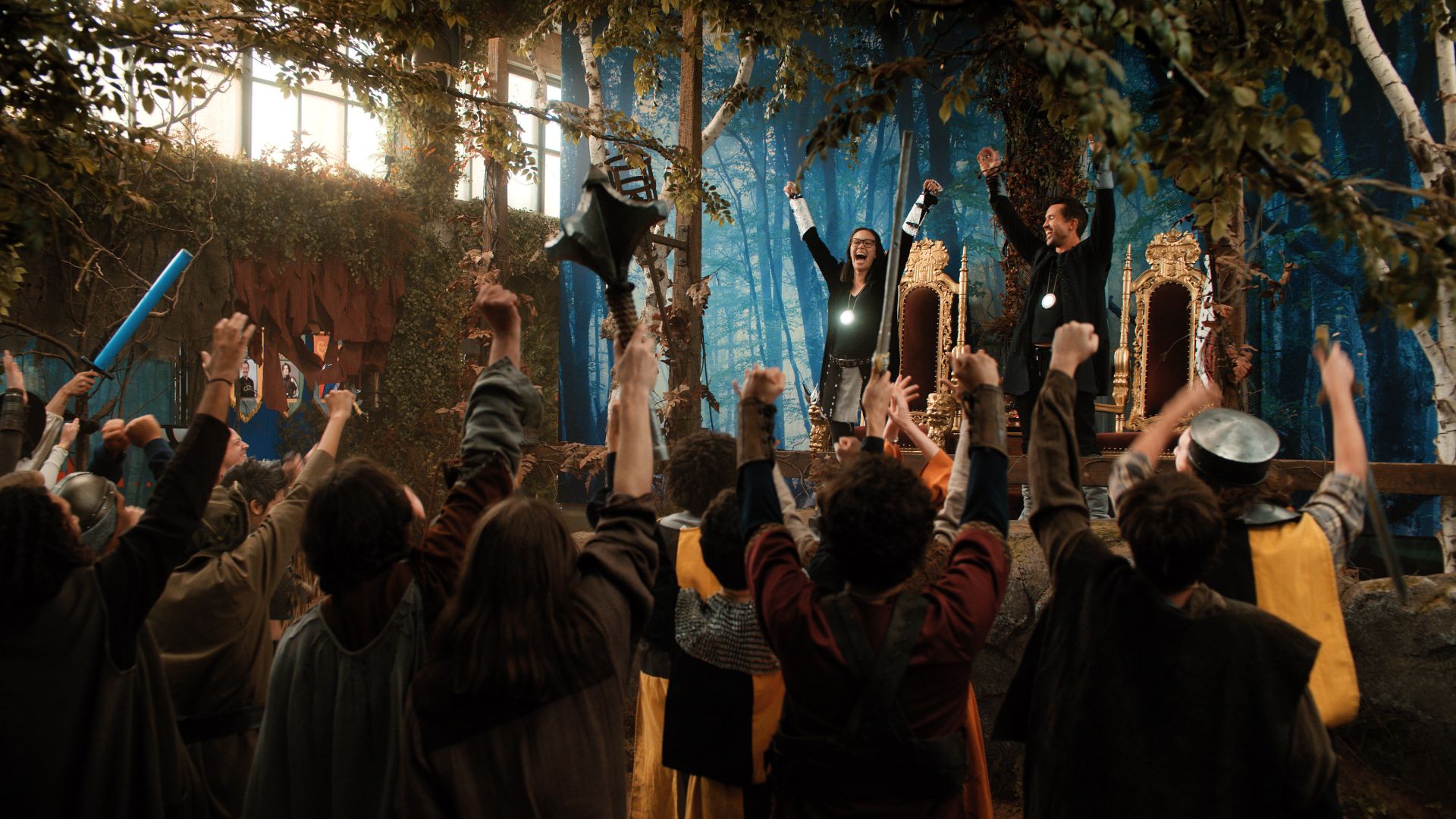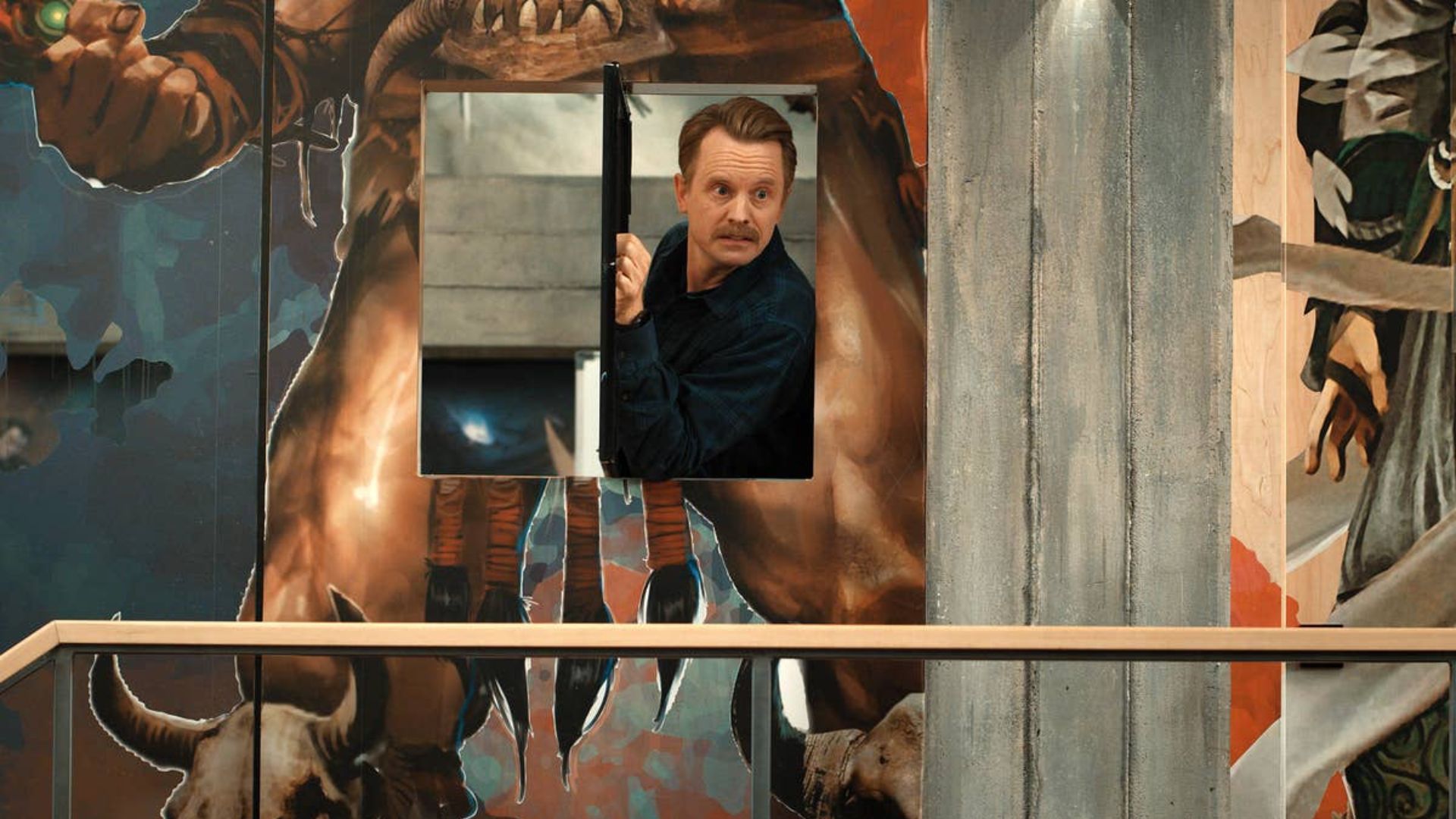Mythic Quest: The Apple TV Plus show returns – more experimental than ever
We spoke to the cast of Mythic Quest – including Rob McElhenney, Ashly Burch, and Danny Pudi – about the wholesome comedy's return

Often the awkward dweebs or stoner dropouts, gamers have never been portrayed particularly favorably on screen. However, as the general perception around gaming has changed, so too has the way Hollywood looks at the industry. Last year, Apple went as far as to launch a workplace sitcom set in a fictional video game company's offices, resulting in one of the most wholesome and binge-able shows of the last few years, Mythic Quest. And as with all good games, a sequel was inevitable.
Created by the team behind the notoriously disheveled comedy It's Always Sunny in Philadelphia, Mythic Quest returns better than ever. The second season picks up after following two pandemic specials – the Zoom-filmed "Quarantine" and the back-to-work "Everlight" – and things are surprisingly normal. In fact, the pandemic, which remains ongoing as the new season arrives, barely gets mentioned by the characters other than the occasional joke about how much better working from home was.
"We knew that the second season was not going to have COVID as a storyline at all – we wanted to put that in the rear-view mirror," Rob McElhenney, who plays Ian Grimm, the co-creative director of the fictional game Mythic Quest, says. "To do that, we had to at least bridge the gap between being at home, and then being back at the office. So we made 'Everlight' which addresses head-on what it's going to be like to return to a sense of normalcy, which we recognize is going to be rife with lots of practical difficulties, but also emotional difficulties. How do we navigate that in a way that's really optimistic and hopeful for the future? That was the inspiration behind the episode, and that's why we wanted to make it."
Pushing past the pandemic

"Everlight" is a hopeful, joyous celebration of the workplace and the colleagues we spend too much time with. The special sees the Mythic Quest team engage in a LARPing (that's live-action role-playing) tournament, where they fight with foam swords and shields to become champion. There's one segment that's filmed in a particularly cinematic style, and the episode sets the tone for the second season.
"Those two episodes provided a bridge when we were hoping to then leave [the pandemic] behind, and get back into a world that was more about the relationships between our characters, and wasn't so topical," says Megan Ganz, who co-created the series with McElhenney and fellow It's Always Sunny alum Charlie Day. "We're hoping that the stories that we're telling in the second season will stand the test of time, and that people looking back on these years – they'll have a little time capsule in the quarantine episode of what it was like, but that won't be the entirety of the show."
The first season ended with Charlotte Nicdao's Poppy Li becoming Ian's co-creative director. Taking on the role, though, comes with a new set of issues, as Poppy struggles to command a room and Ian finds that no longer being the solo Alpha a problem. Meanwhile, Danny Pudi's Brad Bakshi, the head of monetization, has become even more empowered after stealing executive producer David's (David Hornsby) assistant, Jo, played by Jessie Ennis.
"Having chemistry with Danny is very easy," Ennis says over a Zoom call with Pudi present. "The two of us really reveled in the fact that we got to figure out ways to move in unison. So the two of us would practice walking, so that our strides would be in unison, or we would practice hand movements that would ground us into this dynamic that we get to play with – all the way down to things like prop choices and costume choices. My character starts to wear clothes that are kind of reminiscent of Brad's outfits.
Sign up for the Total Film Newsletter
Bringing all the latest movie news, features, and reviews to your inbox
"She's hilarious," Pudi adds. "In season one, we [talked together about] our mutual love of predator-prey videos, which the writers saw. And that, for me, informed everything. I thought, we're all looking for that one person who enjoys watching predator-prey videos as much as we do. And I found that with Jessie."
Brad's influence over Jo is felt from the go in season two. Not only are they walking, talking, and dressing the same, but Jo takes Brad's worst predatory characteristics and runs rampant. "The faster you climb, the harder you fall," Ennis continues. "And so we watch what happens to her when she tries to fly too close to the sun, and how that plays out for her."
Another duo to go through significant changes this season are Imani Hakim's Dana and Ashley Birch's Rachel, two fellow game testers. Their will-they-won't-they relationship moves on dramatically in the first episode, setting up a season-long arc. "I am so grateful to be the one that was chosen to represent that group of people, of the LGBTQ community, a woman of color, a black woman in particular, and to be in that space of gaming," says Hakim. "There were so many pockets that we're tapping into without forcing it down your faces. It's very niche to be able to check all those boxes. One of my favorite things is reading the feedback online, and how people from those different communities feel seen. They don't feel like we're making fun of them, even though it's a comedy show. It feels very warm and authentic. I love being able to play that role."
Meanwhile, though the pandemic gets few mentions in the new season, there's a very practical repercussion of filming episodes in 2020: the great F. Murray Abraham, who plays the cooky lead writer C.W. Longbottom, appears in the show via Zoom calls. However, his character's presence is certainly felt as one breakout episode midway through the season flashes back to a younger version of C.W. as he embarks on a writing career. In fact, much like the first season's stand-alone episode "A Dark Quiet Death", which guest-starred Jake Johnson and Cristin Milioti as two characters not seen anywhere else in the show, the new episode focuses on an entirely different cast of actors.
I'm friends with some game developers that said that the show was very triggering for them
Ashly Burch on Mythic Quest
"That was a good trick," Abraham laughs as we discuss another actor (who will go unnamed here) plays his character. "What it was, was the chance to examine my character through another character's eyes. It's a little frightening, because what if he was a terrible actor? What would I do then? But he was very good. The whole segment was so good. It was like a lovely, little movie."
"We knew we wanted it to be really special," adds Ganz, "because obviously when you're creating the lore and the backstory of your characters, you want it to be really rich and full, because, even in the first season, people had fallen so in love with C.W. that they had projected a whole personality onto him.
"But as far as Murray acting through the screens for the first half of the season – it was a drag not to have him there. We really missed him on set all the time. But we wanted to make sure we had all of our health and safety protocols just top-notch by the time he came in. And he stepped in halfway through the season, and we knew that we had these special episodes for him later in the season where he would really get to show off all of his brilliant talents. So I hope he had fun."
"You know I did," the Oscar-winning actor says with another laugh.
At 81-years-old, Abrams is one of the few Mythic Quest members to not be an avid gamer. ("I don't play video games," he says. "They tried to show me how to do it, and they just laughed at me. They think it's silly. I play pinball machines.") Birch, though, is a recognizable name within the game industry, having voiced various characters in multiple major franchises, including Mel in The Last of Us 2, Kate Bishop in Marvel's Avengers, and – most famously – Aloy in Horizon Zero Dawn. She's therefore perhaps the perfect person to ask about the response to the show from the industry.
"I'm friends with some game developers that said that the show was very triggering for them," she says with a smile. "I was really hoping that people would feel like it was authentic, and I think I was surprised to find just how many people responded to it as being really representative of their experience in games. Which was my hope, as someone that loves games and is familiar with the industry. I didn't want people to be like, 'Oh, God!' But I wanted people to be like, 'Yes, that is what it is like. That's my experience. I am the pillow that players scream into.' So that's been really gratifying. I was hoping that that would happen, but I think I'm surprised by just how many people from different realms of the industry felt like they were represented."
Time to get experimental...

Though the series may be representative of the gaming industry, McElhenney hopes it stretches far beyond that. "That was one of our concerns from the very beginning. We wanted to make sure that we weren't considered that, quote-unquote, 'video game show', because it'd just turn you off to a large section of the population who doesn't play games, or is not interested in video games.
"What we wanted to make sure we were doing was making a show that seemed accessible to everybody; that anybody could sit down and watch the show and recognize people that they knew, people that they worked with, and sometimes people that they lived with. That was a concern from the very beginning, and something we've actively worked really hard in trying to mitigate."
Mythic Quest is certainly successful in that goal, and season two develops the show's own voice further. This isn't an ordinary sitcom, or necessarily a snarky subversion of the format like It's Always Sunny. And having lured the world into believing this is another simple workplace comedy with its opening episodes, McElhenney now wants to experiment more with what Mythic Quest can be.
"The second season is, in some ways, dramatically different from the first season where, yes, we're still very much exploring the workplace dynamic, but we're starting to tell stories in a more experimental way," he says. "And I think that's just a function of us loving the idea of doing scary things. To me, if you just made the same episode over and over and over again, it could be very successful, because it's something that people feel comfortable with, and they'll keep returning week after week after week to watch it. I think there's absolute validity to that, and I appreciate when people do that. There are some shows I love that do that."
"As a quick digression, The Golden Girls is my favorite show of all time. I was just watching episodes – I watch episodes of it every night with my kids now. I'll watch three or four episodes at a time. What you realize is, they made 250 of the same episode, over and over and over again. It's almost like they had a template, and they just filled in the lines. I love that show. Absolutely love that show. But that's been done. No one's going to do it better than The Golden Girls. Trust me. So why not try something different, something that scares you? That's what we try to do."
While the creative process may be terrifying, Mythic Quest is anything but scary and season two makes sure the series will go down as a must-watch entry in the workplace sitcom pantheon.
Mythic Quest season 2 is available on Apple TV Plus from May 7. "Everlight" is available now.

Jack Shepherd is the former Senior Entertainment Editor of GamesRadar. Jack used to work at The Independent as a general culture writer before specializing in TV and film for the likes of GR+, Total Film, SFX, and others. You can now find Jack working as a freelance journalist and editor.


